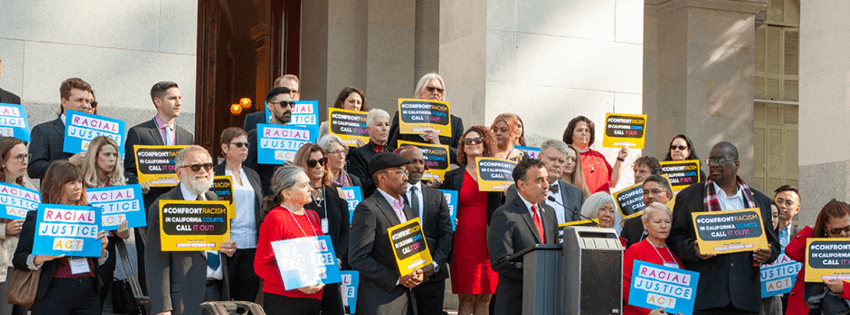
A public database to help ensure a robust implementation of California’s Racial Justice Act
Racial Justice Act
The Racial Justice Act is a California law that prohibits the State from pursuing convictions or sentences based upon race, ethnicity, or national origin. For the RJA to be effective, the public must be able to access policies and data from prosecutors. But this information — which should be readily available — is often difficult to obtain.
Since the law's enactment in 2020, the ACLU, with the support of BraunHagey & Borden LLP, has sought access to prosecutorial records that will ensure a robust implementation of the RJA. The records that we have received, and relevant analyses and court orders, are available here.
Displaying 73 - 78 of 4843 results
Policy or Training Materials
2018.02.20_Alameda County_Humphrey Bail.pdf
County
Alameda County
Relevant Date
Upload Date
Source
Office of the Alameda District Attorney
Summary
This document is a training resource from Alameda County authored by the Alameda County District Attorney's Office. This 13-page "Points and Authorities" document accompanies a "weekly video surveillance of criminal law" prepared for CLE purposes. It focuses on the implications of the California Supreme Court decision in People v. Humphrey, outlining changes to bail determinations, emphasizing the need for courts to consider defendants' ability to pay and alternative conditions of release that ensure public safety and court appearance; and WIC 8013, and the prosecutor's role when an individual seeks the return of firearms after a 5150 detention. This document is from February 20, 2018 and was produced by the Alameda County District Attorney's Office on November 3, 2022 in response to a July 23, 2021 PRA request.
Policy or Training Materials
2018.04.16_Alameda County_Intoxication Evidence I.pdf
County
Alameda County
Relevant Date
Upload Date
Source
Office of the Alameda District Attorney
Summary
This document is a training resource from Alameda County authored by the Alameda County District Attorney's Office. This 10-page "Points and Authorities" document accompanies a "weekly video surveillance of criminal law" prepared for CLE purposes. It discusses the admissibility and use of evidence of voluntary intoxication in criminal cases, as outlined by Penal Code section 29.4, by providing detailed guidance on how voluntary intoxication affects the determination of specific intent crimes versus general intent crimes and discusses the impact of intoxication on various charges. This document is from April 16, 2018 and was produced by the Alameda County District Attorney's Office on November 3, 2022 in response to a July 23, 2021 PRA request.
Policy or Training Materials
2018.04.16_Alameda County_Intoxication Evidence Part 1.mp4
County
Alameda County
Relevant Date
Upload Date
Source
Office of the Alameda District Attorney
Summary
This video is a training resource from Alameda County authored by the Alameda County District Attorney's Office. This is part of a "weekly video surveillance of criminal law" prepared for CLE purposes. It discusses the admissibility and use of evidence of voluntary intoxication in criminal cases, as outlined by Penal Code section 29.4, by providing detailed guidance on how voluntary intoxication affects the determination of specific intent crimes versus general intent crimes and discusses the impact of intoxication on various charges. This video is from April 16, 2018 and was produced by the Alameda County District Attorney's Office on November 3, 2022 in response to a July 23, 2021 PRA request.
Policy or Training Materials
2018.05.14_Alameda County_Voluntary Intoxication and Imperfect Self-Defense#2.pdf
County
Alameda County
Relevant Date
Upload Date
Source
Office of the Alameda District Attorney
Summary
This document is a training resource from Alameda County authored by the Alameda County District Attorney's Office. This 8-page "Points and Authorities" document accompanies a "weekly video surveillance of criminal law" prepared for CLE purposes. It explores the nuances of applying voluntary intoxication evidence to claims of imperfect self-defense, specifically in light of the California Supreme Court decision in People v. Soto. This document is from May 14, 2018 and was produced by the Alameda County District Attorney's Office on November 3, 2022 in response to a July 23, 2021 PRA request.
Policy or Training Materials
2018.05.14_Alameda County_Voluntary Intoxication and Imperfect Self-Defense.mp4
County
Alameda County
Relevant Date
Upload Date
Source
Office of the Alameda District Attorney
Summary
This video is a training resource from Alameda County authored by the Alameda County District Attorney's Office. This is part of a "weekly video surveillance of criminal law" prepared for CLE purposes. It explores the nuances of applying voluntary intoxication evidence to claims of imperfect self-defense, specifically in light of the California Supreme Court decision in People v. Soto. This video is from May 14, 2018 and was produced by the Alameda County District Attorney's Office on November 3, 2022 in response to a July 23, 2021 PRA request.
Policy or Training Materials
2018.07.30_Alameda County_Mental Health Diversion Law.pdf
County
Alameda County
Relevant Date
Upload Date
Source
Office of the Alameda District Attorney
Summary
This document is a training resource from Alameda County authored by the Alameda County District Attorney's Office. This 12-page "Points and Authorities" document accompanies a "weekly video surveillance of criminal law" prepared for CLE purposes. It details the newly implemented Mental Health Diversion program under Penal Code section 1001.36 and outlines the eligibility criteria, application process, and potential impacts on prosecutorial practices.This document is from July 30, 2018 and was produced by the Alameda County District Attorney's Office on November 3, 2022 in response to a July 23, 2021 PRA request.
